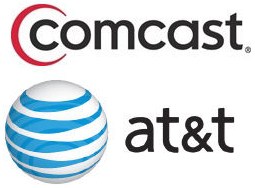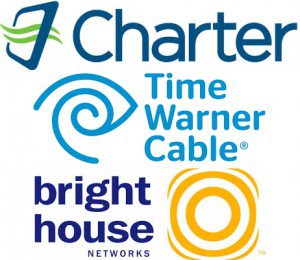 While AT&T is in no hurry to expand and upgrade U-verse broadband to its wireline customers in the United States, the Dallas-based company has spent more than $7 billion trying to attract wireless customers in Mexico that so far don’t show much interest in the U.S. company.
While AT&T is in no hurry to expand and upgrade U-verse broadband to its wireline customers in the United States, the Dallas-based company has spent more than $7 billion trying to attract wireless customers in Mexico that so far don’t show much interest in the U.S. company.
AT&T last month reported it is losing big south of the border. After spending $4.4 billion to acquire two competing wireless companies in Mexico and committing another $3 billion to upgrade their networks to 4G service, customers are continuing to abandon the carrier.
The losses AT&T continues to incur improving wireless service in Tabasco, Veracruz, and Baja California has not bothered AT&T to date — in fact the company plans to dump even more money into the Mexican cellular market, despite achieving a market share of only around 8.5 percent, effectively making it about as relevant as Sprint in the United States. Its largest competitors are the gigantic América Móvil, which has nearly 70 percent of the market and Telefónica, which holds a 22 percent share.
So far, AT&T has been forced to support different websites for its two different carriers – Iusacell and Nextel Mexico. The former also maintains the Unefon brand, which targets low income Mexicans with cheap prepaid service.
Part of AT&T’s problem recouping its investment is the fact Mexicans cannot afford the pricing Americans pay for cell service. While AT&T charges $50+ for a low-end cell plan in Texas, just across the Mexican border AT&T offers a $13 basic plan offering 500 calling minutes and 500MB of data.
 AT&T’s decision to spend billions in Mexico while it reduces spending on further expansion of its U-verse network has nothing to do with Net Neutrality or Title II enforcement by the Federal Communications Commission. It is all about finding new customers. Wireless penetration has now topped 100 percent in the U.S. (because some families maintain multiple devices, sometimes with different carriers). In Mexico, less than 50% of the population has a cell phone and even fewer own smartphones. AT&T believes that gives it plenty of room to grow. AT&T believes wireless service brings the best potential for profits both inside and outside of the U.S., and the company thinks it can dramatically improve market share in Mexico and charge prices that will bring it a healthy return.
AT&T’s decision to spend billions in Mexico while it reduces spending on further expansion of its U-verse network has nothing to do with Net Neutrality or Title II enforcement by the Federal Communications Commission. It is all about finding new customers. Wireless penetration has now topped 100 percent in the U.S. (because some families maintain multiple devices, sometimes with different carriers). In Mexico, less than 50% of the population has a cell phone and even fewer own smartphones. AT&T believes that gives it plenty of room to grow. AT&T believes wireless service brings the best potential for profits both inside and outside of the U.S., and the company thinks it can dramatically improve market share in Mexico and charge prices that will bring it a healthy return.
 Their customers apparently disagree. In Mexico, for the first nine months of the year, AT&T lost 689,000 wireless subscribers — a decline of almost 8 percent. Even customers attracted to try AT&T for the first time often decide to leave, giving AT&T Mexico a churn rate exceeding 5% — five times worse than what AT&T experiences in the United States.
Their customers apparently disagree. In Mexico, for the first nine months of the year, AT&T lost 689,000 wireless subscribers — a decline of almost 8 percent. Even customers attracted to try AT&T for the first time often decide to leave, giving AT&T Mexico a churn rate exceeding 5% — five times worse than what AT&T experiences in the United States.
Some Wall Street analysts are critical of AT&T throwing good money after bad down south. Michael Hodel of Morningstar doesn’t like what he sees. The incumbent Mexican telecom giant América Móvil has kept the lion’s share of the market for years and has vastly more scale than AT&T. Hodel sees losses for AT&T until 2018.
 Others wonder how AT&T Mexico will be able to introduce the premium priced services it will depend on to get a return on its investment. The Mexican economy is unlikely to allow customers to pay substantially more for wireless service.
Others wonder how AT&T Mexico will be able to introduce the premium priced services it will depend on to get a return on its investment. The Mexican economy is unlikely to allow customers to pay substantially more for wireless service.
AT&T CEO Randall Stephenson has told investors if AT&T builds a 4G network, customers will come and pay AT&T’s asking price.
“We are convinced that what we experienced in the U.S., we will experience in Mexico,” Stephenson said at an investor conference in May. “So you are going to see the mobile Internet revolution take off in Mexico. We intend to ride that wave.”
Free trade supporters and those who support the deregulation of the Mexican telecom market are trying to use AT&T’s experience as evidence that free markets and trade works.
“AT&T’s moves are the clearest evidence of success in Mexico’s reforms, and it’s hard to overstate the importance,” said Christopher Wilson, deputy director of the Mexico Institute at the Woodrow Wilson International Center for Scholars in Washington.
For customers, it isn’t a matter of free trade. It’s good coverage at a reasonable price that matters most, and AT&T Mexico has not yet achieved that.
Arturo Diaz, originally an Iusacell customer in Mexico City, recently dropped his AT&T Mexico service.
“Their coverage is not very good outside of large cities and AT&T’s reputation is to raise prices, which they seem to do a lot in the U.S.,” Diaz said. “If you can afford a better phone and plan, you switch to América Móvil. With the stronger American dollar, the peso is devalued again, so more people will likely want a budget prepaid plan which they can get from Telcel. I’m not sure what AT&T is doing in Mexico and their plans from two different companies are a mess. I signed up with América Móvil last month.”
 One of AT&T’s cell towers in Denison, Tex. went missing last Thursday in the 1900 block of West Crawford St. after vandals cut the tower’s supporting guy wires, causing it to collapse.
One of AT&T’s cell towers in Denison, Tex. went missing last Thursday in the 1900 block of West Crawford St. after vandals cut the tower’s supporting guy wires, causing it to collapse.

 Subscribe
Subscribe
 Much of the opposition to municipal broadband comes from Republican politicians on the state and federal level. Most claim municipal providers represent unfair competition to the private sector. The American Legislative Exchange Council (ALEC) considers municipal broadband a significant issue. The corporate-funded group offers state legislators the opportunity to meet with telecom company lobbyists. Legislators are also provided already-written sample legislation restricting municipal broadband developed by ALEC’s telecom company members, including AT&T, Comcast, and Time Warner Cable. In states where Republicans hold the majority in the state legislature, such bills often become law.
Much of the opposition to municipal broadband comes from Republican politicians on the state and federal level. Most claim municipal providers represent unfair competition to the private sector. The American Legislative Exchange Council (ALEC) considers municipal broadband a significant issue. The corporate-funded group offers state legislators the opportunity to meet with telecom company lobbyists. Legislators are also provided already-written sample legislation restricting municipal broadband developed by ALEC’s telecom company members, including AT&T, Comcast, and Time Warner Cable. In states where Republicans hold the majority in the state legislature, such bills often become law.
 AT&T has
AT&T has 


 Since Malone sold TCI, the multi-billionaire has built a significant cable empire in Europe and is today the largest private landowner in the United States. In the U.S., he is best known as the current owner of SiriusXM satellite radio. The two satellite companies merged with an agreement not to raise rates for a few years. As soon as that agreement expired, Malone’s combined Sirius/XM operation began a series of rate hikes and maintain a satellite radio monopoly in the U.S.
Since Malone sold TCI, the multi-billionaire has built a significant cable empire in Europe and is today the largest private landowner in the United States. In the U.S., he is best known as the current owner of SiriusXM satellite radio. The two satellite companies merged with an agreement not to raise rates for a few years. As soon as that agreement expired, Malone’s combined Sirius/XM operation began a series of rate hikes and maintain a satellite radio monopoly in the U.S. While AT&T is in no hurry to expand and upgrade U-verse broadband to its wireline customers in the United States, the Dallas-based company has spent more than $7 billion trying to attract wireless customers in Mexico that so far don’t show much interest in the U.S. company.
While AT&T is in no hurry to expand and upgrade U-verse broadband to its wireline customers in the United States, the Dallas-based company has spent more than $7 billion trying to attract wireless customers in Mexico that so far don’t show much interest in the U.S. company. AT&T’s decision to spend billions in Mexico while it reduces spending on further expansion of its U-verse network has nothing to do with Net Neutrality or Title II enforcement by the Federal Communications Commission. It is all about finding new customers. Wireless penetration has now topped 100 percent in the U.S. (because some families maintain multiple devices, sometimes with different carriers). In Mexico, less than 50% of the population has a cell phone and even fewer own smartphones. AT&T believes that gives it plenty of room to grow. AT&T believes wireless service brings the best potential for profits both inside and outside of the U.S., and the company thinks it can dramatically improve market share in Mexico and charge prices that will bring it a healthy return.
AT&T’s decision to spend billions in Mexico while it reduces spending on further expansion of its U-verse network has nothing to do with Net Neutrality or Title II enforcement by the Federal Communications Commission. It is all about finding new customers. Wireless penetration has now topped 100 percent in the U.S. (because some families maintain multiple devices, sometimes with different carriers). In Mexico, less than 50% of the population has a cell phone and even fewer own smartphones. AT&T believes that gives it plenty of room to grow. AT&T believes wireless service brings the best potential for profits both inside and outside of the U.S., and the company thinks it can dramatically improve market share in Mexico and charge prices that will bring it a healthy return. Their customers apparently disagree. In Mexico, for the first nine months of the year, AT&T lost 689,000 wireless subscribers — a decline of almost 8 percent. Even customers attracted to try AT&T for the first time often decide to leave, giving AT&T Mexico a churn rate exceeding 5% — five times worse than what AT&T experiences in the United States.
Their customers apparently disagree. In Mexico, for the first nine months of the year, AT&T lost 689,000 wireless subscribers — a decline of almost 8 percent. Even customers attracted to try AT&T for the first time often decide to leave, giving AT&T Mexico a churn rate exceeding 5% — five times worse than what AT&T experiences in the United States. Others wonder how AT&T Mexico will be able to introduce the premium priced services it will depend on to get a return on its investment. The Mexican economy is unlikely to allow customers to pay substantially more for wireless service.
Others wonder how AT&T Mexico will be able to introduce the premium priced services it will depend on to get a return on its investment. The Mexican economy is unlikely to allow customers to pay substantially more for wireless service.